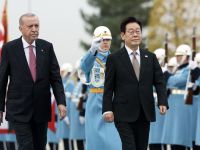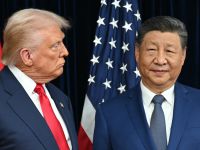Egyptian President Hosni Mubarak has ordered a military trial for 21 recently arrested members of the outlawed Muslim Brotherhood, according to court officials cited by the BBC Online
No date has yet been set for the trial of the men, who were arrested more than a week ago, said the news service.
They were charged with belonging to "an illegal organization," court sources said.
Egypt has cracked down on Muslim militants since the events of Sept. 11, with some 260 suspected militants arrested in the past month.
However, the country of 65 million people, most of them Sunni Muslims, has not been spared a media campaign in the US accusing it, and Saudi Arabia, of failure to back the US-led coalition to combat terrorism.
According to the BBC, the Muslim Brotherhood, despite technically being a banned organization, remains one of Egypt's most prominent and vocal opposition groups, with 17 members of the organization hold independent seats in the parliament.
At the time of the men's arrest, the brotherhood had sharply criticized the Egyptian government for its timing of the raids after the attacks in the US.
"We deplore this ferocious attack, stressing that it does not serve anybody...we also deplore this attack which breaks the national unity," the group said in a statement at the time of the arrests.
The crackdown, however, has prompted international human rights activists to criticize the country for using the US-led war on terror as an excuse to seek vengeance on its political enemies.
Within the same campaign, Egypt has arrested a number of Islamist "fundraisers" who have allegedly collected money to support Islamic movements in other parts of the world, according to a report by the Washington Post.
Egyptian authorities have lately arrested Sheikh Nashat Ibrahim, who is well known for the power of his Friday sermons at the Nasser City mosque.
However, they focused on what they saw as his prowess in raising money. When investigators arrested Ibrahim in May, they alleged that he was a central figure in a network that had collected about $1 million over two years for causes ranging from Muslim rebels in Chechnya to the Islamic resistance movement in Gaza and the West Bank, a lawyer involved in the case told the paper.
With passionate speeches about the need to support fellow Muslims under attack, Ibrahim was key in collecting cash, jewelry and other donations that were spirited abroad by the bagful - with the Palestinian Islamic resistance movement, Hamas, suspected of receiving as much as half, authorities alleged.
"We don't know his goal," said a lawyer representing another defendant in the case. "But the government says this is not just for families or social aid, but was buying weapons for jihad, for Hamas and for Chechnya."
According to a defense lawyer in the case as well as news accounts, Ibrahim is now on trial for his life, with 84 others.
The defendants include at least one other Cairo-based religious scholar, identified by Al Hayat newspaper as Fawzi Al Sayeed, and five students from the southern Russian region of Daghistan who were studying at Al Azhar University, the Arab world's oldest and most venerated school of Islamic studies - Albawaba.com
© 2001 Al Bawaba (www.albawaba.com)







